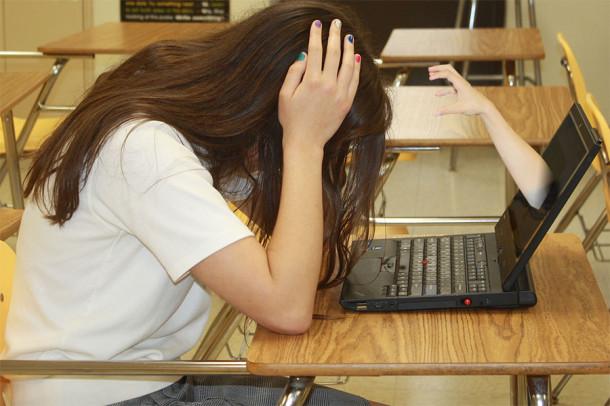Cyber-bullying takes serious toll on JC students
June 24, 2013
“You should kill yourself because nobody likes you, and you don’t deserve to live” reads on the screen.
Not long ago, Amber stared at her computer with a mix of shock and horror. What was happening? She knew that she had enemies, but not to this extent. She felt like she was going to throw up.
While Amber is not her real name, Amber is a real JC student that has experienced cyber-bullying. People were creating pages about her on Facebook and messaging her rude things. According to Bullyingstatistics.org, one in three teenagers have received online threats. Amber is one of these.
The first time it happened to her she was not expecting it. As a coping mechanism, she began to cut herself, and the scars still mark her arms.
Only 1 out of every 10 cyber-bully victims tells their parents if they are cyber bullied, according to Bullyingstatistics.org. Amber told her parents, but they did not believe her. She also told the guidance counselor at her middle school. The guidance counselor thought that Amber was the bully because of other students’ testimonies.
“I see a lot of bullying especially on YouTube. People just call each other bad four letter words,” Sophomore William Smith said.
Students witness cyber-bullying on social networking sites. Facebook and Twitter were among the most popular before they were blocked by JC.
According to sophomore Selena Ranney, “Facebook, Twitter, Tumblr, and Instagram are basically the most popular websites. They are in the favorites bar on everyone’s’ computer screens. If you’re on there for at least 5 minutes, you will see at least three derogatory terms.”
Last year, Principal Madelyn Ball called an assembly about the High School Memes that people were creating because she was concerned that they were a form of cyber-bullying.
Guidance Consular Larry Hensley believed it “is a huge problem at JC.”
“It has increased significantly over the years and is probably the primary way of bullying,” he said.
However, the students themselves have had mixed reactions to cyber-bulling.
Sophomore Grace Lee said, “Yeah [bullying] is a problem. People make fun of people that are different from them. They don’t respect people. I think everyone has their own character that we can respect and not say things because they are different.”
On the other hand, Freshman Will Torkaski disagrees with Lee.
“Not at all, absolutely not [cyber-bullying is not a problem]. People are just stupid,” Torkaski said.
Cyber-bullying can lead to anxiety, depression, and even suicide according to Bullyingstatistics.org. “Cyber bullying was the cause of my problems,” Amber said.
Cyber-bullying has been going on in Amber’s life for the past three years and continues to occur at JC. “It made me feel suicidal and extremely bad about myself to the point where I didn’t know if I wanted to go on anymore,” Amber said.
Smith feels that most teenagers do not intend to hurt peoples’ feelings with cyber-bullying.
“I think most people don’t realize what they are doing. They just sort of do it and think ha-ha they’re funny, and they don’t realize that they are actually hurting people,” Smith said.
According to DoSomething.org, 81 percent of teenagers think that bullying people online is easier to get away with.
Bullies and their parents can face legal charges for cyber-bullying according to Bullyingstatistics.org. In 2010, a court case against nine students from South Hadley, Massachusetts was about cyber-bullying. Phoebe Prince, a 15-year old girl, committed suicide after months of cyber-bullying and in-school bullying. Phoebe’s nine classmates were convicted for bullying her according to NYdailynews.com. The convictions included stalking, criminal harassment, and violations of civil rights.
Cyber-bullies may not have to face immediate consequences for their bullying, but often deal with problems in the future according to Bullyingstatistics.org. Colleges and jobs look into their applicants’ social networks and will turn cyber-bullies down.
According to Hensley, “Cyber-bullying is immediately addressed with the Dean of Students if it occurs here. The bullies could be assigned counseling sessions, detentions, demerits, and even suspension depending on the seriousness of the issue.”
Rachel Amrhein is a Reporter for The Patriot and jcpatriot.com



